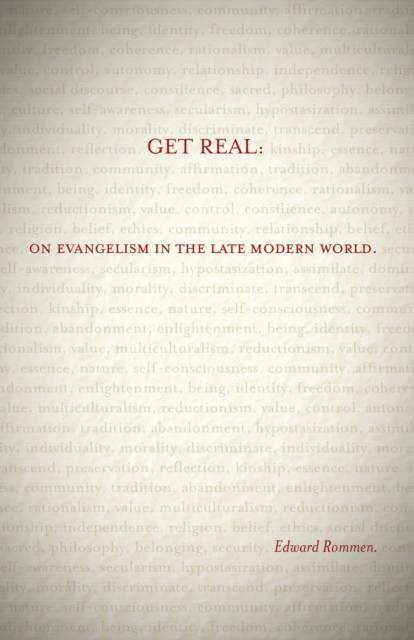
Bedankt voor het vertrouwen het afgelopen jaar! Om jou te bedanken bieden we GRATIS verzending (in België) aan op alles gedurende de hele maand januari.
- Afhalen na 1 uur in een winkel met voorraad
- In januari gratis thuislevering in België
- Ruim aanbod met 7 miljoen producten
Bedankt voor het vertrouwen het afgelopen jaar! Om jou te bedanken bieden we GRATIS verzending (in België) aan op alles gedurende de hele maand januari.
- Afhalen na 1 uur in een winkel met voorraad
- In januari gratis thuislevering in België
- Ruim aanbod met 7 miljoen producten
Zoeken
Get Real: On Evangelism in the Late Modern World
On Evangelism in the Late Modern World
Edward Rommen
Paperback | Engels
€ 34,95
+ 69 punten
Omschrijving
Evangelism in the Late Modern World
The gospel is more than information about the death and resurrection of our Lord. It is an invitation to enter, by way of personal faith, into a relationship with the person referenced by our propositions. Our task as believers is to mediate saving communion with a personal being upon whose will our very existence is contingent. It is precisely this personal aspect of our message, the Gospel-as-Person, that is in conflict with the late-modern notions of the Self and social discourse.
Get Real: On Evangelism in the Late Modern World describes how the late-modern phenomena of existential anxiety, social alienation, and epistemic uncertainty have resulted in what some have called "the loss of Self." It also identifies ways in which that loss obstructs both the presentation of and the reception of the Gospel-as-Person. Finally, it shows how the Gospel-as-Person facilitates the recovery of the Self and social discourse, and how that message can be effectively presented in the late-modern context.
The gospel is more than information about the death and resurrection of our Lord. It is an invitation to enter, by way of personal faith, into a relationship with the person referenced by our propositions. Our task as believers is to mediate saving communion with a personal being upon whose will our very existence is contingent. It is precisely this personal aspect of our message, the Gospel-as-Person, that is in conflict with the late-modern notions of the Self and social discourse.
Get Real: On Evangelism in the Late Modern World describes how the late-modern phenomena of existential anxiety, social alienation, and epistemic uncertainty have resulted in what some have called "the loss of Self." It also identifies ways in which that loss obstructs both the presentation of and the reception of the Gospel-as-Person. Finally, it shows how the Gospel-as-Person facilitates the recovery of the Self and social discourse, and how that message can be effectively presented in the late-modern context.
Specificaties
Betrokkenen
- Auteur(s):
- Uitgeverij:
Inhoud
- Aantal bladzijden:
- 262
- Taal:
- Engels
Eigenschappen
- Productcode (EAN):
- 9780878084630
- Verschijningsdatum:
- 27/06/2010
- Uitvoering:
- Paperback
- Formaat:
- Trade paperback (VS)
- Afmetingen:
- 140 mm x 216 mm
- Gewicht:
- 308 g

Alleen bij Standaard Boekhandel
+ 69 punten op je klantenkaart van Standaard Boekhandel
Beoordelingen
We publiceren alleen reviews die voldoen aan de voorwaarden voor reviews. Bekijk onze voorwaarden voor reviews.









